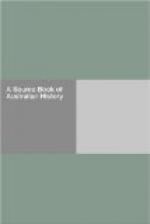This expedition, which has proved so completely successful, resulted from two previous attempts. One of these was made by water, by His Excellency the Governor, in person, whom I accompanied.
The other expedition was undertaken by myself, attended by three European servants and two natives, with a horse to carry provisions and other necessities. We returned sooner than I intended, owing to one man being taken ill. This journey confirmed me in the opinion, that it was practicable to find a passage over the mountains, and I resolved at some future period to attempt it.
Soon after, I mentioned the circumstance to His Excellency the Governor, who thought it reasonable, and expressed a wish that I should make the attempt. Having made every requisite preparation, I applied to the two gentlemen who accompanied me, to join in the expedition, and was fortunate in obtaining their consent.
To these gentlemen I have to express my thanks for their company and to acknowledge that without their assistance I should have had but little chance of success.
The road which has since been made deviates but a few rods in some places from the line cleared of the small trees and bushes, and marked by us. Nor does it appear likely that any other line of road will ever be discovered than at the difficult and narrow passes that we were fortunate to discover, by improving which a good carriage road has now been made across the mountains. Mount York is the Western summit of the mountains, the vale Clwyd, the first valley at their feet from which a mountain (afterwards named Mount Blaxland by His Excellency Governor Macquarie) is about eight miles; which terminated our journey.
I remain, dear sir, most respectfully,
Your affectionate nephew,
G. BLAXLAND.
On Tuesday, May 11, 1813, Mr. Gregory Blaxland, Mr. William Wentworth, and Lieutenant Lawson, attended by four servants, with five dogs and four horses, laden with provisions, ammunition, and other necessaries, left Mr. Blaxland’s farm at the South Creek, for the purpose of endeavouring to effect a passage over the Blue Mountains, between the Western River, and the River Grose.
On the following morning (May the 12th) as soon as the heavy dew was off, which was about nine a.m., they proceeded to ascend the ridge at the foot of which they had camped the preceding evening. After travelling about a mile on the third day in a west and north-west direction, they arrived at a large tract of forest land, rather hilly, the grass and timber tolerably good. They computed it as two thousand acres. Here they found a track marked by a European, by cutting the bark of the trees. They had not proceeded above two miles, when they found themselves stopped by a brushwood, much thicker than they had hitherto met with. This induced them to alter their course, and to endeavour to find another passage to the westward, but every ridge which they explored proved to terminate in a deep rocky precipice, and they had no alternative but to return to the thick brushwood, which appeared to be the main ridge, with the determination to cut a way through for the horses the next day.




